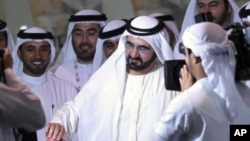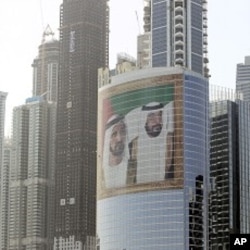Voters in the United Arab Emirates elected 19 men and one woman to the UAE's legislative advisory body in the country's second-ever national poll.
Women made up nearly 20 percent of those running in Saturday’s Federal National Council elections. According to preliminary results, Sheikha al-Ari from the lesser known emirate of Umm al-Quwain and 19 Emirati men will be appointed to the 40-seat assembly. The other 20 members will be chosen by the country’s leaders.
Minister of State for Foreign Affairs Anwar Mohammed Gargash expressed disappointment in the low number of successful female candidates.
However, Dubai voter Sara Khalif al-Kamda was more optimistic.
“At the end of the day, we are all UAE citizens and we’ve all won,” she said.
Election day saw a low turnout with only a little more than a quarter of the roughly 129,000 eligible voters, hand-picked by the government, casting their ballots.
Authorities increased the size of the electorate earlier in the year in consideration of the pro-democracy uprisings in the region. The UAE itself has largely avoided opposition unrest. Toby Jones, assistant professor of Middle East History at Rutgers University, says voter apathy in the world’s third largest oil exporter can largely be attributed to the fact that the FNC has no real law-making power.
“Citizens will say of course that they’re happy to see there’s some semblance of reform going forward, but at the same time, they’ll admit there’s no political empowerment that comes from these elections,” said Jones.
The FNC is responsible for submitting draft laws that may or may not be approved by the nation’s ruling families.
Five Emirati activists were arrested earlier in the year and are currently on trial for signing a petition calling for more power for the body.
Nevertheless, Dubai voter Saeed al-Otibi says this year’s vote is proof that the nation is committed to democratic reform.
“We cannot say it will change 100 percent, but for the future, it's a nice step," he said. "I think it will help the people here to change a lot of things.”
Voter turnout was also poor in neighboring Bahrain, which held parliamentary by-elections on Saturday.
The ballot was held to fill 18 seats abandoned by members of the opposition al-Wefaq party, who quit in protest over the government’s bloody crackdown on pro-democracy demonstrations earlier in the year. The election was boycotted by al-Wefaq and other opposition parties.


